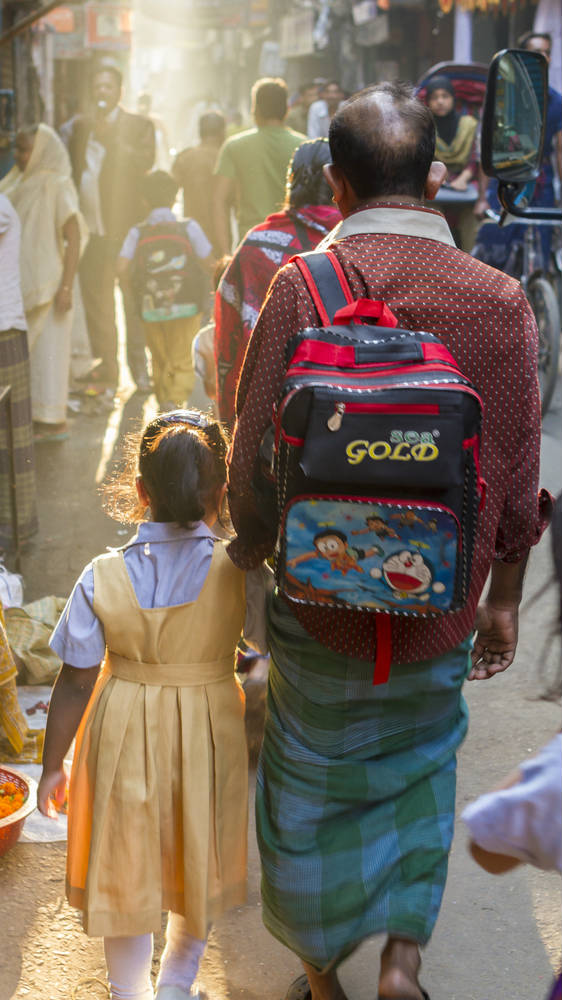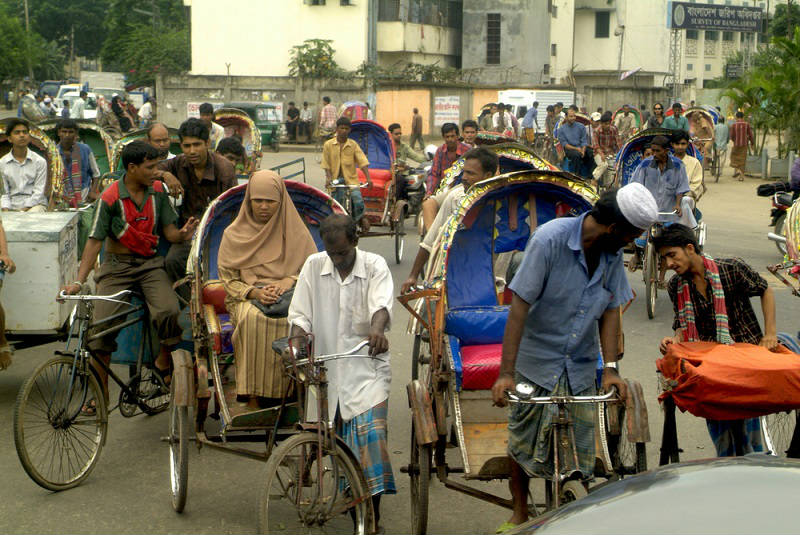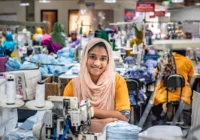Following his recent visit to Bangladesh, Lucas Ausems argues that only dialogue and mutual understanding will lead the country forward.
When I arrived in Dhaka on October 30, I had no knowledge of Bangladesh, save for what I had learned at university during a couple of lectures on decolonization and its aftermath in South Asia. My taxi ride to the hotel was uneventful. The roads were relatively quiet and people seemed to be going about their business as usual. I arrived safe and sound. Everything seemed to be perfectly fine.
Then I switched on my phone and laptop and the messages flooded in. “Be careful, a plot to assassinate the Bangladeshi prime minister has been discovered,” my friend from neighboring India wrote. “There are protests going on because of the death sentence of the Jamaat-e-Islami’s Matiur Rahman, be safe,” was another message from a friend in New Delhi. Then the hotel staff knocked on my door and advised me not to leave the premises because there was a hartal (political protest or strike) going on and it might unsafe for me as a foreigner.
I searched online for more information and discovered that Bangladeshi society is still marked by the events of the country’s 1971 liberation war. The verdicts of Bangladesh’s International Crimes Tribunal on the fates of alleged war criminals spark a wide range of emotions among citizens. In the past, hartals and other protests often became violent, leading to vandalism, violence and death on multiple occasions. There are also reports that the tribunal’s verdicts were highly politicized. The mark of unfairness — even corruption — surrounding the trials has polarized public opinion and added to tension in Bangladesh.
Perhaps I visited the country at a bad time, I wondered. But, at the same time, I thought this was clearly an important moment for Bangladesh as a nation, and I had a front row seat to watch it all unfold. Other questions arose in my mind: Considering its past, do the protests over the verdicts mean that Bangladesh is again in turmoil? Or is it developing a civil society that is expressing its opinion over the government’s actions? If so, is this the next step in Bangladesh’s development as a democratic state?
Since independence, Bangladesh has struggled to establish political stability and liberalism. Over the years, controversial elections, political feuds and corruption have put an enormous strain on the country. For any nation to achieve political stability, it is imperative that government and civil society alike are able to settle their differences peacefully through mutual understanding and dialogue. The bloody protests and clashes of 2013 show that Bangladesh was unable to achieve that. Will Bangladeshis be able to do so now? If hartals proceed peacefully, can that be seen as a sign of improving stability or just as a deviation from the trend?
Encountering the Rallies
The next day, all seemed quiet and peaceful, but I was still on guard. I stayed indoors for the remainder of the day — a chance to relax and get my bearings. There was a hartal that day, and there were hartals scheduled for November 2-3 as well. So, I thought the next day would be safer to venture out.
That night, over dinner, other guests at the hotel who were volunteering in the country advised me to be careful during hartals. Some volunteers were not even allowed to go far from the hotel on strike days, as instructed by their employers.
But I was curious to go out and explore. After all, I had never visited Bangladesh, and I didn’t want to spend my whole time in a hotel. From what I had seen, there were no indications that the country was in any kind of turmoil. I never felt I was in danger. On the contrary, all the Bangladeshis I met were kind and helpful.
The next day, I set out on my own. I believed that as long as I stayed away from hartals I would be fine. With a map in one hand and a camera in the other, I began exploring. I walked, I watched and I observed — cars going by, rickshaws ringing their bells, people on the streets. Everything seemed quite normal, quite peaceful.
The streets didn’t feel different at all the next day, despite a hartal occurring. In fact, the streets were comparatively quieter and life seemed to go on as usual. To satisfy my curiosity, I decided to go to Shahbag Square to see rallies in support of the recent tribunal verdicts. I believed those to be safer to attend than the hartals. When I arrived, there was no sign of a rally. The square was occupied by merchants selling food and drinks; students stood together in groups and the place had a positive atmosphere.
The rally that took place in the morning had since concluded. I went to a stand belonging to the Gonojagoron Moncho (Public Awareness Platform), a Bangladeshi activist group closely monitoring the proceedings of the tribunal. In the past, they have been able to rally thousands to protest against verdicts that were perceived as too lenient. I spoke with one of the activists; he was very keen to give me more information and then invited me to join them at the rally the following morning. So, naturally, I accepted the invitation and found myself standing at Shahbag Square yet again the next day.
The rally was much smaller than I expected, though this was probably because people were demonstrating in support of the latest batch of verdicts, not against. There couldn’t have been over 150 people actively participating in the rally. There was an army of photographers and journalists scurrying about like ants, onlookers watching from a distance and, of course, the police, keeping a watchful eye over everything. There was a lot of shouting, lauding the independence of Bangladesh and about delivering justice to those who wronged it, amplified by megaphones set up throughout the square.
The activist I spoke to the previous day untangled himself from the mass of shouting people to greet me and invited me to join the march up and down the street. I politely declined. This wasn’t my country; this wasn’t my rally. I was there as a neutral observer, watching Bangladesh take another step toward reconciling itself with a troubled past.
I wondered if the people showed the same level of participation in political affairs other than those of the tribunal. A 2008 study by the Asian Development Bank showed that nongovernmental organizations (NGO) are very active in the political field, jumping into many of the legal and human rights gaps left by the government. However, this leaves the government vulnerable to becoming too dependent on NGOs. After all, it is a government’s job to ensure all legal and human rights to its citizens. It is a telling sign that 44 years since independence, NGOs are still needed to bridge the same gaps in Bangladesh.
The rally went on peacefully. A short while later, I left to explore other parts of the city. There was no sign of a hartal or disturbance elsewhere.
The following day, I took a bus to Bagerhat to see the mangrove forest Bangladesh is known for. Here, too, people warned me of hartals but also assured that they were mostly centered in and around Dhaka and that Bagerhat was safe. They were right: I didn’t find anything but regular people going about their everyday business. The hartals seemed far away. I did read in the newspapers that there had been skirmishes with the police in Dhaka and a couple of vehicles had been burned.
This gave more weight to the warnings everyone had given me about hartals, and it raises the question as to whether or not Jamaat-e-Islami — an Islamist political organization that was banned by the incumbent Awami League government, and one that is an ally of the Bangladesh Nationalist Party (BNP), the main opposition — will sit idly by while its leading members continue to be prosecuted. In addition, what will these verdicts mean for Bangladesh in the long-term, especially looking at the country’s social and political future, given the increasing radicalization of the Islamist party? The further development of this trend will prove to be another test for the stability of Bangladesh and its ability to uphold its secular values – especially with groups linked to al-Qaeda trying to gain a foothold in the country.
Reflections
Even though calls by Jamaat-e-Islami are not always heeded, the fear of new escalations throwing the country into turmoil yet again is real. Tensions might still flare up as the war crimes tribunal continues. A 2014 overview of all clashes and arrests in Bangladesh reveals that a good deal of tension brews beneath the country’s seemingly calm surface
While the country enjoys one of its more politically stable periods since achieving independence from Pakistan, Bangladesh remains on edge. The main weakness in the nation’s stability and largest hindrance to its development is the ongoing feud between opposition leader Khaleda Zia and Prime Minister Sheikh Hasina.
Bangladesh needs constructive political discourse. The BNP and the Awami League must stop pitting their supporters against one another, so lives are not lost in the process. Just as importantly, Bangladeshis need to realize that only dialogue and mutual understanding will lead to progress and development; violence is never the answer. A society less susceptible to the squabbling of political rivalry is less prone to fall into chaos.
Fair Observer is a nonprofit organization dedicated to informing and educating global citizens about the critical issues of our time. Please donate to keep us going.
The views expressed in this article are the author’s own and do not necessarily reflect Fair Observer’s editorial policy.
Photo Credit: Dana Ward / Fritz16 / Shutterstock.com
Support Fair Observer
We rely on your support for our independence, diversity and quality.
For more than 10 years, Fair Observer has been free, fair and independent. No billionaire owns us, no advertisers control us. We are a reader-supported nonprofit. Unlike many other publications, we keep our content free for readers regardless of where they live or whether they can afford to pay. We have no paywalls and no ads.
In the post-truth era of fake news, echo chambers and filter bubbles, we publish a plurality of perspectives from around the world. Anyone can publish with us, but everyone goes through a rigorous editorial process. So, you get fact-checked, well-reasoned content instead of noise.
We publish 2,500+ voices from 90+ countries. We also conduct education and training programs
on subjects ranging from digital media and journalism to writing and critical thinking. This
doesn’t come cheap. Servers, editors, trainers and web developers cost
money.
Please consider supporting us on a regular basis as a recurring donor or a
sustaining member.
Will you support FO’s journalism?
We rely on your support for our independence, diversity and quality.









Comment